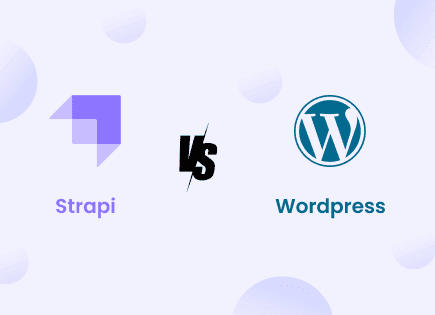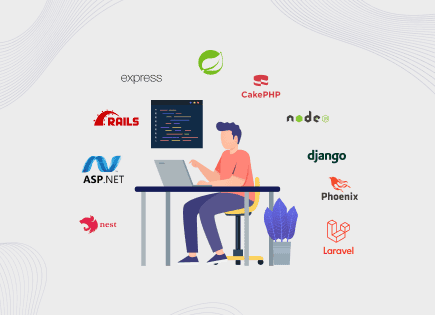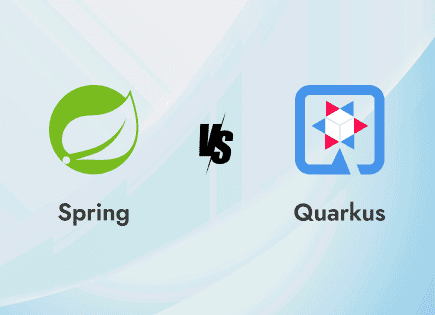Table of Content
Need to scale your logistics operations? Let our consulting experts help you build efficient, scalable solutions for your business
Get in touch
Java vs. Python: Who Will Win the Backend War?
Table of Content

So, you’ve stumbled across the Holy Grail of the programming argument: Java vs Python.
Java and Python have been pioneers of software development for the past 30 years. Plus, both are immensely popular languages: they are used by millions of developers for programs that run on billions of devices and are likely to be among the future programming languages and beyond.
Up until about five years ago, Java was the superior language when it came to the number of users as well as the areas of application. However, the advent of machine learning and web development has changed all that: Python now boasts more users and has new areas of development.
But the Javanese have also been fighting back. The increasing popularity of mobile applications has put Java right back into the mix.
So, which language is better?
Which one reigns supreme?
Which language is best suited for your project?
Is Python easier than Java?
In this blog, we’ll take a comprehensive look at the Python vs Java argument till we determine a clear winner. To do so, we’ll compare them across areas like syntax, backend development, speed, performance and security. We’ll also discuss the appropriate use cases and real-life examples of Python programming vs Java.
So, strap in and enjoy the showdown between the two giants of programming.

Java: The Undisputed King of Programming Languages
Java is a high-level programming language released by Sun Microsystems in 1995. It is one of the most widely used programming languages. Over 90% of Fortune 500 companies and over 30% of all programmers and developers harness Java's power to power their development projects.
So, what makes it this popular?
First, Java follows a “Write Once, Run Anywhere” principle. This means that once you’ve compiled a code in Java, you won’t have to recompile it for different devices or platforms. Second, Java’s language closely resembles that of C and C++, which makes it very easy for programmers to understand and use.
Features of Java:

It is an object-oriented language that allows developers to create classes and objects for programs.
It is platform-independent, so code written in Java can be used for mobile and computer devices alike.
Java allows multithreading, which means you can run and execute parallel threads and programs.
Java comes with Automatic Memory Management, so programmers don’t have to allocate or deallocate memory.
It is a highly secure language that allows you to restrict access to specific programs.
Advantages of Java
Java offers several advantages, most of which flow from its robust features. Some of its most useful advantages include:
Reusable Modules: Java allows users to create reusable classes and objects,
Simple, Elegant: Java is relatively easy to learn and simple to use. It also delivers a smooth experience to its users,
Error-Free: Java minimizes the chances of memory-related errors,
Cost-Effective: Java reduces the cost of development because its code can run on multiple platforms and follows the Write Once Run Anywhere principle,
Community Support: Java is supported by a strong developer community, thousands of useful libraries and intuitive frameworks.
Disadvantages of Java
Lastly, while Java offers several advantages, it is not without its drawbacks. Let’s take a brief look at some of the challenges of Java development:
Hardware Manipulation: Java offers programmers less control over a system’s hardware compared to C or C++
Memory Consumption: Because Java operates on the basis of a Java Virtual Machine, it increases the memory consumption,
Hardware Prerequisites: Java requires robust hardware to run its programs,
Garbage Collection: Programmers can’t manually control the memory consumption and garbage collection in Java.
Despite these disadvantages, Java remains one of the most popular programming languages worldwide. Let’s take a look at how Java powers some of the largest and most popular companies worldwide.
Popular Use Cases of Java

As we have seen, Java powers millions of devices, programs and applications around the world. Let’s take a look at some of the most popular use cases of Java:
If you’re like us and spend a lot of time on LinkedIn looking at the “People You May Know” tab, you’ve experienced Java programming first-hand. LinkedIn relies on more than 400,000 lines of code, all written in Java.
The King of Search uses Java as its server-side programming language. Google also utilizes Java in building back-end networking, intuitive user interfaces and server code.
Amazon
The world’s largest online shopping store uses Java to ensure the security of valuable customer data as well as legacy systems. It also relies on Java for big data analysis, web development and application development.
Netflix
The streaming giant Netflix uses Java for backend development and demand engineering. This is because Java has a strong ecosystem and intuitive frameworks for building a robust streaming service.
The popular image and video-sharing platform uses the Hibernate framework of Java for software development and to provide users with customer support.
When to Use Java?
From what we’ve seen, you can’t become a Fortune 500 or multinational company without using Java in one form or another. So, where and how can Java help you power your software development?
Here are some cases in which Java development can accelerate the development and deployment of your software or programs:
Enterprise Applications: If you want to create enterprise applications to streamline workflows and foster collaboration, Java is your go-to programming language.
Mobile Applications: Java’s Micro Edition is the best platform for creating robust, smooth mobile applications and providing users with a cutting-edge experience.
Games: We have all seen the Java logo flash up on our screens while playing some of the most popular and classic mobile games. This is because Java’s architecture allows developers to create intricate gaming applications.
Cloud-Based Applications: Java’s portability and platform independence make it one of the most popular applications for creating cloud-based applications. It also has several libraries and frameworks that support the creation of cloud-based infrastructure.
Artificial Intelligence Development: If you want to create an AI-based algorithm or app feature, an AI development company can help you. They are using Java which will help you to develop powerful artificial intelligence algorithms as well as virtual reality programs. It also supports artificial neural networks, robotic automation, and machine learning.
Thus, Java is one of the best programming languages for accelerated software development. It will help you deliver secure enterprise applications, intuitive user experiences and sophisticated software architecture.
Python: The Gentle Giant of Programming Languages
Released more than thirty years ago in 1991, Python is a high-level programming language that emphasizes code readability. Today, it is used by over 8 million developers and some of the world's most popular companies. In fact, over 50% of programmers report using Python for software development.
What makes Python indispensable to software developers?
Python is one of the easiest programming languages to learn and code. It is also free and open-source, whose source code is available to the public, which adds to its appeal. Lastly, it is a dynamically typed language and Python code can be run on multiple platforms without requiring modifications.
Features of Python:

Python is a high-level language that allows developers to interact with the hardware;
It is an object-oriented language, which means programmers can create classes and objects that form the basis of applications or websites;
Python is an integrated language, so each line of code drafted in Python is understood separately by the Python interpreter;
It is a highly versatile programming language, it supports code written in other languages like C, Java, C# and more,
Lastly, Python is a portable language: Code written in Python can be executed on multiple platforms and operating systems without being refactored or recompiled.
Advantages of Python
Like Java, Python also offers its users myriad advantages that align closely with its extensive features.
Some of its most notable advantages are:
Multipurpose Orientation: Python can be used for a variety of purposes, including both front-end and back-end development, mobile app development, software development and more,
Debugging: Since each line of Python code is interpreted separately, debugging is extremely simple. It allows developers to save time and quickly develop iterations or solutions for programming errors.
Expansive Support: One of the major advantages of using Python is that you never have to start coding from scratch. This is because it is supported by a robust developer community, several libraries and useful frameworks,
Easy to Code, Easy to Read: Python code follows an extremely intuitive architecture, reducing the time and effort required to create even the most complex programs.
Advanced GUI Support: Python allows users to create the most sophisticated graphics user interfaces through modules like PyQT5, PyQT4 and others.
Disadvantages of Python
Apart from these useful advantages, Python also has some disadvantages, such as:
Slow Runtime: Python code takes some time to run because it is interpreted line-by-line by the interpreter.
Mobile App Development: While Python is excellent for desktop applications and programs, it is a relatively weak language for developing mobile applications.
Memory Consumption: If you want to develop applications that perform memory-intensive tasks, Python may give you a slightly clunky user experience because it accommodates and caters to various data types.
Slower Development: Python’s architecture is such that some errors only show up when the application is running. This may slow down application development.
Enterprise App Development: Similar to mobile apps, Python is less useful when it comes to enterprise app development. This is because it is a relatively less secure language and makes access to databases more difficult.
Popular Use Cases of Python

While Python has a combination of advantages and disadvantages, this has not prevented it from being used by some of the largest companies in the world. Here are some companies that use Python to power their software development:
The world’s largest social network loves Python due to its expansive libraries. This means that developers never have to start writing code from scratch, and Python also makes maintenance and iterations faster and easier.
Python is one of the four main languages used by Google. The King of Search uses it to power most of its web services. Further, YouTube’s algorithm is written almost exclusively in Python.
Stripe
One of the most popular payment interfaces in the world, Stripe, uses Python for programming the interfaces of its web and mobile applications. According to Stripe, Python also renders complex operations like large calculations possible and more efficient.
Python is the leading programming language that makes it possible for Reddit to host more than 400 million users every month. Reddit uses Python to maintain its caching abilities, search engine and message queue.
NASA
The list of Python users would be incomplete without NASA. One of the world’s foremost aerospace engineering organizations, NASA, was an early adopter of Python. It has used Python for improving workflow collaboration as well as shuttle mission planning.
When to Use Python?
One thing is clear: using Python seems unavoidable in today’s development landscape. But when exactly should you use Python for software development? Take a look at the following situations and see if one of them is what you’re looking for.
Web Development: If you’re looking to build a cutting-edge website or web application, Python is the back-end language you need to use. While Java and HTML are popular front-end languages, no language is as useful as Python when it comes to back-end development.
Machine Learning: The easy debugging of Python has far-reaching benefits for machine learning. So much so that no other programming language is as good as Python when it comes to developing Machine Learning algorithms. So, if you’re looking to automate business processes, Python is the language for you.
GUI-Heavy Apps: As we have seen, Python has dedicated libraries that support the development of graphics-heavy applications and software. So, if you’re looking to develop apps or websites that deliver graphics-heavy user experiences (like audio or video streaming platforms), Python is your go-to language.
Image Processing Applications: Do you want to develop an e-commerce platform that lets users search for products through images? Well, Python may be the language you’re looking for. It supports heavy image processing, so your users can shop for anything they see and like.
Enterprise App Development: Looking for the best language to develop enterprise apps? Python is the one you want. It will help you create some of the most sophisticated enterprise apps for tight-knit communities and workforces. It can also help develop robust ERPs and e-commerce applications.
What is the Difference Between Java and Python?
Now that we’ve understood the features and use cases of both languages, it’s time to get into the Java vs Python debate. Before we dive into the differences, let’s remember that both have their own sets of advantages and disadvantages.
That being said, let’s see what sets them apart and which one you should use: Java or Python.
Metrics | Java | Python |
Typing | Statically Typed | Dynamically Typed |
Architecture | Compiled | Interpreted |
Dependency | Platform-Independent | Platform Independent |
Learning Curve | Steeper, More Complex | Flatter, Easy to Pick Up |
Speed | One of the Fastest Programming Languages | Fast, but Not as Fast as Java |
Performance | Suited to Handling a High Volume of User Requests | Suited to Analyzing Large Amounts of Data |
Development | Slower, More Intricate Development Process | Faster Development, Fewer Lines of Code |
Libraries | Expansive Network of Libraries | Growing Network of Libraries |
Security | Highly Secure Development, In-Built Security Tools | Less Secure Language, Requires Additional Security Tools |
Mobile Development | Highly Suited to Mobile Development | Not Suited to Fast Mobile Development |
1. Popularity
When it comes to popularity, Python has slowly overtaken Java. This is because Python is easier to learn than Java. However, that doesn’t mean Java is unpopular either. In fact, when it comes to enterprise applications, Java retains its top spot and finds more favor with larger companies.
2. Syntax
Java is a statically typed language, while Python is a dynamically typed language. Thus, when it comes to Python vs Java syntax comparison, the typing doesn’t provide a clear conclusion.
This is because typing also affects security concerns, development speed, and error detection. So, the decisive arguments in the Python vs Java debate hinge on metrics other than the nature of their syntax.
3. Performance
Both Java and Python are designed to provide high performance. However, the Python vs Java performance debate has different application areas. While Java can power complex enterprise app architecture and sophisticated mobile apps, Python is more suited to automation and data analytics.
4. Speed of Development
Because Python is a dynamically typed language that is more intuitive, Python development requires less time. Additionally, Python’s libraries ensure that no coding operations start from scratch. However, Python development might slow down because some errors are only reflected during runtime.
On the other hand, Java development requires less time. But Java offers speed in a different sense: applications coded in Java run much faster than those coded in Python.
So, similar to the performance debate, Python vs Java speed of development depends on which area of development you want to optimize.
5. Security
While Python’s dynamic script may lead to faster development, it also poses considerable security risks. Thus, setting up a robust security network may require additional tools or configurations.
Java, on the other hand, comes with an in-built Security Manager tool. This means that it provides features like access control and authentication, making Java ideal for banking, enterprise and government applications or software.
6. Mobile Development
Python's advantages over Java run scarce when it comes to mobile development. This is because Python doesn’t support native mobile development. So, you might have to use popular backend frameworks for mobile development.
Java, on the other hand, is an official Android language. The Android SDK comprises standard Java libraries that accelerate mobile application development.
So, the Java vs Python debate has a clear winner when it comes to mobile app development.
7. Industry Comparison
Often, the interlocutors in the Java vs Python debate belong to entirely different industries. For instance, Python’s benefits over Java are more pronounced in industries like data science, machine learning, web app development, science, social media and education.
On the other hand, Java’s benefits are more appreciated in industries like finance, e-commerce, retail, mobile app development, insurance, supply chain management and logistics.
Thus, the Python vs Java argument has different winners depending on which industry you operate in and which areas you’re looking to optimize.
Is Python Easier Than Java?
Yes, Python is easier to understand and code than Java. This is because it is a dynamically typed language, closer to the language we use daily. This also makes Python development faster.
However, Python's dynamic nature also makes it weaker in security and error detection. This is because some errors in Python codes only show up during the runtime.
So, while Python may be easier than Java, Java provides a more robust and secure platform for software development.
Java vs Python: Which is the Language of the Future?
Java vs Python both have their unique features and advantages. But which one should you choose? While Java and Python might look like competitors fighting each other to be the best programming language, in reality, they are both suited to different projects.
So, you can use either of the languages to power your project, depending on your requirements.
If you want to develop a cutting-edge mobile application for your users, Java is the best language for you. On the other hand, if you’re looking to automate business processes, Python is the language you’re looking for.
If you’re not sure which language best suits your development needs, the best way to find out is to engage a professional developer or a development consultant.
Development experts will understand your project's needs and demands and give you an informed recommendation on which language is best suited to your development journey.
At Green Apex, we’re here to listen to your development needs and provide you with expert development consultancy services tailored to your industry, enterprise and organizational objectives. We specialize in providing Java development services to a variety of projects and enterprise requirements.
Our DevOps experts have years of development experience in both languages and will help you craft a detailed development timeline for your project.
Contact our DevOps experts and discover which language can equip your enterprise with the application or software you’re looking for.
Java or Python: Which is Best for Your Project?
Unlock expert insights to help you make an informed choice for your enterprise application.
Talk to an Expert
FAQs
While Java and Python have several areas of overlap in their capabilities, they also have their own exclusive characteristics. Java is more suited to mobile app development, scalable apps and enterprise-centric applications. Python, on the other hand, is better for data analysis, machine learning and web development.
Java is better than Python in areas like mobile development, security, and scalability. Python's benefits over Java include its applications in machine learning, development speed, and ease of learning.
Companies prefer Java due to its applications in enterprise app development. It also provides in-built security features such as authentication and access control. Further, Java also allows companies to craft interactive mobile applications for their users.
Related Blogs

Strapi vs WordPress Headless: Which CMS is Best for Your Project?
Making a website may feel daunting, but CMS (content management system) makes it a lot easier. ...

Top 10 Backend Frameworks You Must Know in 2025
Are you looking to develop a groundbreaking mobile or web app but don’t know which backend framework to ch...

Spring Boot vs Quarkus: Which Java Framework to Choose for Development?
Framework dilemma? Feeling paralyzed about whether to choose Quarkus or Spring Boot for your next project? ...















